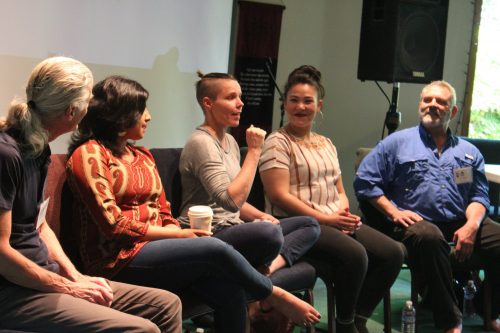 Before going to bed each night after a long day of rehearsals, the director of “Alice in Wonderland” wrote a letter, sealed it, and put it under her pillow. The letter was addressed to her theatrical hero, Eva Le Gallienne (1899-1991), a revolutionary figure on the American stage whose adaptation of the Alice stories was first presented in the early 1930’s at the Civic Repertory Theater in New York City, which she founded with the mission of providing the highest-quality dramatic artistry for the widest possible audience.
Before going to bed each night after a long day of rehearsals, the director of “Alice in Wonderland” wrote a letter, sealed it, and put it under her pillow. The letter was addressed to her theatrical hero, Eva Le Gallienne (1899-1991), a revolutionary figure on the American stage whose adaptation of the Alice stories was first presented in the early 1930’s at the Civic Repertory Theater in New York City, which she founded with the mission of providing the highest-quality dramatic artistry for the widest possible audience.
The director, Sara Bruner, has for many years been one of the brightest creative lights at the Oregon Shakespeare Festival in a variety of acting roles. The Le Gallienne adaptation of “Alice” is her first major directing opportunity at OSF, and she devised this pre-sleep practice of writing pillow missives as a way to gently soothe and channel her anxieties before sleep. She would write to Le Gallienne about the challenges of the day, the unique demands of the production, and her creative hopes for the future.
This was one of the many intriguing insights to emerge from the panel discussion held at the recent regional meeting of the International Association for the Study of Dreams in Ashland, Oregon, May 31 to June 2. The panel was on Sunday morning and feature an ideal line-up: Sara, the director; Emily Ota, the actor who performs as Alice; and Amrita Ramanan, the director of literary development and dramaturgy at OSF who helps Sara and the cast with the broader story-telling context of the “Alice” tales. Several people were curious about the role of the dramaturg in a theatrical production, and it was fascinating to hear Amrita describe the many ways in which she enhances the whole creative enterprise. It made me think of a dream studies analogy: at some level, a dramaturg enables what Jung called the process of amplification, helping the dreamer (or cast) recognize the concentric circles of biographical, cultural, historical, and mythological meanings surrounding the dream (or play), all as a way of enhancing its unique significance right now.
We did not record the session, alas, because we wanted to allow for more spontaneity in the discussion. (Passing microphones around in a small room is awkward, especially with professionals who are trained to project their natural voices.) But the panel certainly made it clear that the intersection of dreams and theater is a lively space for deep discussions about the nature of creativity, imagination, and the lived experience of an artistic life.
The panel was enhanced by Bernard Welt, a long-time IASD member and emeritus professor of Film and Humanities, who co-facilitated with me. Angel Morgan, the local host of the weekend gathering, also helped by asking great questions, as did Isaac Taitz, Stanley Krippner, and David Gordon.
In response to one of Isaac’s questions, everyone on the panel said they experience anxiety dreams about their work in the theater. Emily even said she has found the appearance of such dreams to be an expected part of learning a new role: once she starts having nerve-wracking dreams about it, she knows the role has begun to sink in.
The panel also discussed at some length the stagecraft used to generate a sense of magical dreaminess in “Alice.” Without revealing any spoilers, I would say that Sara’s approach is deceptively brilliant, like a master class in the cognitive psychology of perception: it uses the simplest objects, shapes, and gestures to elicit in the audience a maximal response in their imaginations, prompting them to creatively join with the performers in (re-)telling a classic yet eternally new story.
This will not be the last such gathering to discuss dreams and theater with OSF artists. The annual conference of the IASD is scheduled for Ashland in 2021 (June 13-17), and there will likely be additional regional gatherings between now and then. Think about coming to join us….
